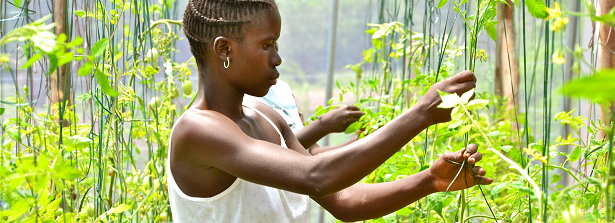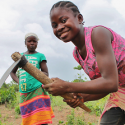The future of our food

On December 9, a seminar was held in Wageningen, the Netherlands on the topic of youth in agriculture. The seminar was organized by the Centre for Development Innovation (Wageningen UR/CDI), AgriProFocus, KIT Royal Tropical Institute and Young Professionals for Agricultural Development (YPARD). This item describes the results of those debates and highlights potential knowledge questions and activities that could emerge around the topic.
With the current growth of the world’s population and peoples changing diets, feeding the world is high up on the agenda. The world’s population is also becoming strongly rejuvenated and the topic of youth in agriculture is receiving increasingly more and more attention. The seminar “The future of our food” was designed to rethink current structures and practices around this topic by bringing together a considerable group of people from different backgrounds (15 countries and different sectors) to share ideas and experiences in various “world café sessions”. A detailed report of the seminar can be found here.
The seminar highlighted many issues. One topic that stood out was the current paradigm around farming and how it needs to be broken. Our world is in need of “future farmers” and future food security. However, farming has a negative image as of late and it is not perceived as an attractive work field for young people. It is often assumed that youth would be able to find a good job in agriculture. Agriculture is a very broad field however and includes more than just farming such as agribusiness, marketing, distribution, engineering and financing. Therefore, different skills are needed dependent on the type of work. Young people often do not have the right skills to take on a role in agriculture due to a lack of adequate education or they are not in the right position, for example, because their families do not have a farm. Other constraints that youth face in the agricultural sector also include a lack of access to markets or no access to finance. Therefore it is important to consider how to attract youth towards the many different aspects of agriculture.
Another issue that was brought forward was that a too narrow focus on youth might limit the possibility for a wider discussion on how to change current agricultural systems. Nevertheless, youth could bring forward the innovations that are needed in agriculture. Young people are trying to balance between the current (unsustainable) production methods and the challenges of modernity. There could be a great deal of potential for changes in current systems if youth were more involved in current processes. As highlighted in the seminar, youth prefer networking and clustering versus following a leader. Furthermore, young people are often more technically skilled and interested in exploring modern tools. Though the concept of youth is very broad and it is not a homogeneous group; opportunities and challenges for young people are very diverse and context sensitive. Therefore it is important to consider what is meant by “youth” and how to include youth in specific contexts.
As a result of the seminar discussions, it became quite clear that there is a great opportunity to jointly explore further knowledge questions related to youth in agriculture with various partners. An articulated conceptual framework to comprehensively address youth issues in all its dimensions is currently lacking. What “youth” means and how to address youth in agriculture in different contexts still needs further exploring. A large number of the participants indicated a need for a Community of Practice around this topic for further exchanges of knowledge and information. In line with this, it was also mentioned that evidence for youth responsive agricultural policy-making needs to be researched.
A conclusion of this first event was that young farmers and agro-entrepreneurs need to be involved in (innovative) processes around agricultural development. This will also be a new topic for the follow-up seminar that will be held on January 20, 2016.
Please see our Knowledge Portal for further interesting publications on youth in agriculture.
For further information and questions, please contact Vanessa Nigten at






